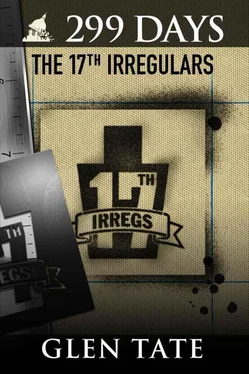“We have orders from HQ to train up a hundred-man unit out here,” Sap said. “They approved the plan and authorized us to have the supplies for it. This is going to happen. For real.”
Sap let that set in.
“We’ll slowly build up out there,” Ted said. “A couple guys at a time. We’ll bring them and supplies out here by boat. A couple guys, a couple sets of weapons, a couple weeks of food at a time. The new arrivals can settle in. We’ll be making improvements to the farm at first. Mostly getting the sleeping quarters up and running. And the dining facility. And sanitation. That’s a biggie.”
“Who are the guys you’re bringing out?” Rich asked. He wanted to make sure—even though he trusted Ted and Sap—that they weren’t importing a gang.
“The first few boatloads are Patriot regulars,” Ted said. “Guys from other units. Mostly Army. We’ve been assigned about a dozen 11 Bravos.” That was the Army term for infantrymen.
“We have a couple Navy guys who know how to build up a facility,” Ted said. “They’re Seabee reservists actually,” Ted said referring to the Navy’s construction battalions or “Seabees.” They were combat engineers and construction experts. Plus they knew how to pick up a rifle and use it.
“We have an Air Force electrician coming out. He was a RED HORSE,” Sap said, referring to the Air Force acronym for a special team of airmen who went into a makeshift forward air base and got it up and running. And knew how to fight if the base was attacked.
Dan, the Air Force security forces veteran, gave a thumbs up. “Those RED HORSE dudes know their shit.”
“What about comms?” Scotty asked, referring to communication.
“We got a Navy comms guy,” Ted said. “Very squared away. We have some equipment coming for him, plus a surprise comms asset that will blow your mind.” Ted and Sap smiled at each other.
“So a dozen infantrymen, maybe a half dozen Navy and Air Force guys,” Grant said. “Who else?”
“We’re not exactly sure,” Ted admitted. “Most irregular units have the majority of their unit as volunteers. Raw civilians. Up to 90% of the unit is civilians. In a typical unit.”
“Is this a typical unit?” Rich asked.
“Probably not,” Ted said. “We are so close to all the large former military bases here. That means there are lots of guys like me and Sap near here. Our unit will probably get lots of former regular military. At least that’s what I’m anglin’ for.”
This was very comforting to everyone. They were fine joining up with a unit of civilians, but if they were in a unit with lots of regular military, that would be much better. Way more effective and way safer.
“We’ll take all the good civilians we can, though,” Sap said.
“We’re screening them at HQ,” Ted said, referring to Boston Harbor. “We’re finding out what skills they have, what military experience, if any, they have. We’re checking out their fidelity to our cause, too.”
“How?” Rich asked. He was a curious by nature and being a cop for several years taught him to ask questions in order to fully understand things.
“We try to see if they have anything obvious in their background, like former government employment,” Ted said. “Non-military government employment, that is. But so many people worked for the government right before the Collapse that this is not a very selective criterion. We mostly rely on referrals from people we know are Patriots. We have a little test we do in some cases.”
“What’s the test?” Scotty asked.
“Well, it’s classified but you guys are part of the club,” Ted said with a smile.
Ted explained, “We give a revolver to someone we’re not sure about. They don’t know it, but they’re dummy rounds in the cylinder. We tell them to shoot a captured Lima in the head. The ‘Lima’ is one of our guys pretending to plead for his life. If the recruit pulls the trigger, which makes a ‘click’ sound, then we know he or she is OK.”
“This trick will get out soon and we’ll have to move on to another one,” Sap said. “But it’s useful now. Besides, while we fully expect the Limas to try to infiltrate us, they have better things to do. I mean, they have a full-on war to fight with us—regular units versus regular units. They don’t need to spend their time sending in guys to spend a year trying to infiltrate little guerilla bands like us. We have total control on all communication devices our people have, so it’s not like an infiltrator could send out reports. Well, not without James Bond kind of equipment. And if the Limas have that stuff working properly, they won’t be wasting it on going after 100 irregulars.”
“These kinds of wars are messy,” Ted said, who had spent over twenty years fighting guerilla wars like this one. “You just have to do what you can to screen for infiltrators. We spend a lot of time and energy watching them and making sure they aren’t sending back reports.” What Ted didn’t tell them is that several regular military people, including him and Sap, would constantly be asking recruits the same questions to see if their stories were consistent. If an odd answer was given, the person who gave it would receive further scrutiny, maybe a formal interrogation. Maybe worse, if it turned out they were an infiltrator.
The guys on the Team were a little concerned that an infiltrator might make it into the unit and call in an airstrike on the Marion Farm. In peacetime, this would have been a horrifying thought and scared them away from doing whatever it was that would put them in that danger. But now, in wartime, this was just another risk they encountered in their new-normal daily life. They didn’t exactly shrug off the risk, but it didn’t stop them from doing what they had to do. They just dealt with it. Besides, the Limas were having a hard enough time just keeping the semis rolling.
“I bet one of the reasons to isolate the trainees at the Marion Farm is to keep an eye on them,” Pow said.
“Yep. Very much so,” Sap said.
Grant was thinking about Al, the guy who oversaw the people coming into Pierce Point from the outside…so he asked a question.
(July 18)
“What about walk-ons?” Grant asked. “You know, people coming to the gate? Could you use any of them?”
“Sure,” Ted said. “If they meet our criteria. Who would screen them?”
“There’s a guy at the gate who does that,” Grant said and explained who Al was. “I have established a relationship with him. I can talk to him about sending us potential military recruits.”
“Whoa,” Ted said. “Who is he and can we trust him? I mean, I don’t want anyone to know what we’re doing out here.”
Grant was a little mad that Ted seemed to be assuming Grant would just blab to Al about what was going on at Marion Farm. “He won’t truly know what’s going on out here,” Grant said. “He’ll be told the ‘rental team’ cover story.”
“Oh, OK,” Ted said, “I guess that’s OK.”
Grant had another question. “What are you looking for in walk-on recruits? So I can tell Al what to be looking out for.”
“Guys with nothing left to lose,” Ted said. “Homeless, hungry, mean. Not psycho mean, but revenge mean. Preferably people who lost everything because of jackass politicians. Maybe they’re looking for a way to get even.” This kind of person had been the backbone of guerilla movements and revolutions for thousands of years.
Ted thought some more. “Single guys. We can’t really take in their families. I mean, we can’t have a daycare at a guerilla camp.” Ted had actually seen that in some of the camps he’d operated throughout the world. “Well, maybe we could take in families, but they’d have to have the right skills. Some really good skills, like a guy whose wife is a nurse. I’d take that family.”
Читать дальше











